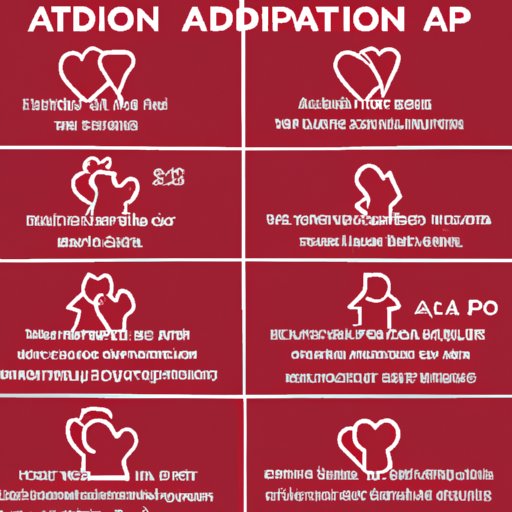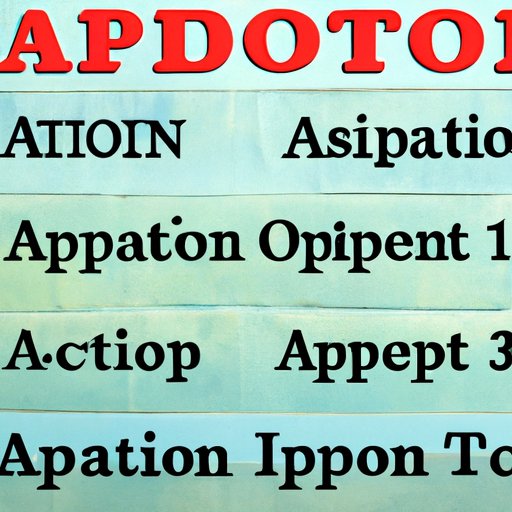Introduction
Adoption is defined as the act of legally assuming the parenting of another, usually a child, from that person’s biological or legal parent or parents. It is a lifelong commitment to provide love, protection and support to a child who needs a family. The adoption process can be a long and complex one, but it is also a rewarding experience for those who choose to adopt.

Outline Steps of Adoption Process
The adoption process typically involves six main steps: initial consultation, home study, matching with a child, finalizing the adoption, post-placement visits and post-adoption services. Each step of the process is important and requires careful consideration and planning.
Initial Consultation
The first step in the adoption process is to consult with a licensed adoption agency or attorney. During this initial consultation, you will discuss your reasons for wanting to adopt, your expectations and any questions you may have. The consultation will help you determine if adoption is right for you and what type of adoption best suits your needs.
Home Study
Once you have decided to move forward with adoption, you will need to complete a home study. A home study is a series of interviews conducted by a social worker to evaluate your home environment, family dynamics and ability to provide a safe and loving home for a child. The home study process typically includes background checks, references, financial information and more.
Matching with a Child
After your home study is approved, you will then be matched with a child who is available for adoption. Depending on the type of adoption you choose, this could take place domestically or internationally. The matching process can take anywhere from several weeks to several months.
Finalizing the Adoption
Once you are matched with a child, the next step is to finalize the adoption. This involves completing the necessary paperwork and attending court hearings. The court hearing is the final step in the adoption process and is where the adoption is legally finalized.
Post-Placement Visits
After the adoption is finalized, the adoption agency or social worker will conduct post-placement visits with the adoptive family. These visits are designed to ensure that the child is adjusting well to their new home and that the adoptive family is providing a safe and supportive environment.
Post-Adoption Services
Post-adoption services are available to adoptive families and include counseling, support groups, education and more. These services are designed to help both the adoptive family and the child adjust to their new life together.
Types of Adoptions
There are three main types of adoptions: domestic, international and foster care. Each type of adoption has its own unique set of requirements and regulations.
Domestic Adoption
Domestic adoption is the process of adopting a child who is born in the United States. Domestic adoptions can be either open or closed, meaning the birth parents may or may not have contact with the adoptive family after the adoption is finalized.
International Adoption
International adoption is the process of adopting a child from another country. International adoptions involve navigating different laws, customs and regulations, so it is important to work closely with an adoption agency or attorney who specializes in international adoptions.
Foster Care Adoption
Foster care adoption is the process of adopting a child who is currently in the foster care system. Foster care adoptions often require additional paperwork and court hearings, so it is important to understand the laws and regulations in your state before beginning the process.
Legal Aspects of Adoption
Adoption is a legal process, so it is important to understand the laws and regulations in your state. Working with an experienced attorney can help ensure that all legal requirements are met.
Understanding State Laws
Each state has its own set of laws and regulations regarding adoption. It is important to research the laws in your state and understand what is required for the adoption process to proceed.
Working with an Attorney
Working with an experienced adoption attorney can be beneficial during the adoption process. An attorney can help guide you through the legal aspects of adoption and ensure that all paperwork is completed correctly.
Obtaining Birth Certificates
After the adoption is finalized, you will need to obtain a new birth certificate for the adopted child. This can be done through the vital records office in your state.
Financial Costs Associated with Adoption
Adoption can be expensive, with fees and other expenses ranging from thousands to tens of thousands of dollars. It is important to research the costs associated with adoption and plan ahead financially.
Fees and Expenses
Adoption fees and expenses vary depending on the type of adoption and the agency or attorney you work with. Some of the common fees and expenses associated with adoption include home study fees, legal fees, court costs, travel expenses and more.
Financial Assistance
There are several organizations and programs that offer financial assistance to families looking to adopt. Researching these resources can help reduce the cost of adoption and make the process more affordable.
Emotional Journey of Adoption
Adoption is an emotional journey for both the adoptive family and the child. It is important to be prepared for the highs and lows that come with adoption.
Expectations vs. Reality
It is important to be realistic about the adoption process. According to a study by the National Council For Adoption, “Many prospective adoptive parents enter the adoption process with high expectations that the process will be quick and easy, but in reality, it takes much longer than most people anticipate.”
Challenges of Post-Adoption
It is also important to understand the challenges of post-adoption. Adjusting to life with a new family member can be difficult, and there may be times when the child struggles to adjust. It is important to be patient and understanding during this time and seek out support if needed.
Building Family Connections
Finally, it is important to focus on building connections with your new family member. Building strong relationships with your child can help them adjust to their new home and feel more secure in their new environment.
Conclusion
Adoption is a rewarding experience, but it is also a complex process with many steps, types and costs. Understanding the process, legal aspects, financial costs and emotional journey of adoption can help make the process smoother and more successful. There are many resources available to help with the adoption process, so don’t hesitate to reach out for assistance.
(Note: Is this article not meeting your expectations? Do you have knowledge or insights to share? Unlock new opportunities and expand your reach by joining our authors team. Click Registration to join us and share your expertise with our readers.)
